"Being a Mother to One Child in a Community of Big Families is an Endless Heartache"
After giving birth to her first child, Eliraz Israeli faced 13 miscarriages and two additional births. Chaya Shmidov had a daughter after seven years of treatments, and Efrat Libi had two children before her family planning was halted. A riveting documentary reveals the journey of couples experiencing secondary infertility and their quest to expand their families.
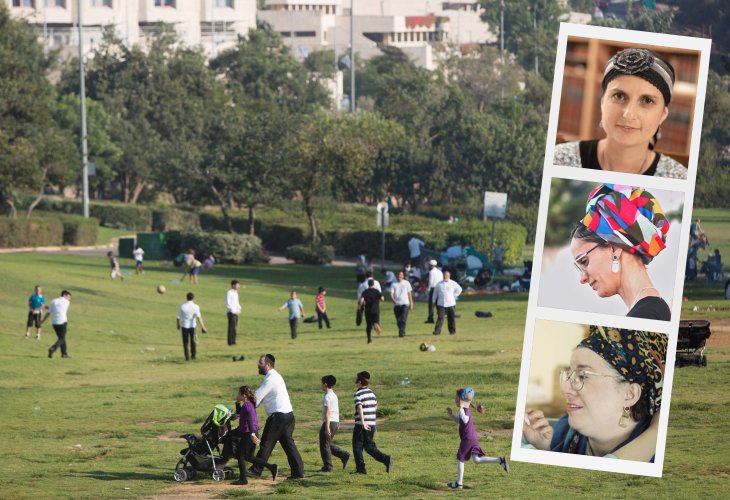 (Photo: Yonatan Sindel / Flash 90)
(Photo: Yonatan Sindel / Flash 90)"It's not that you don't have children, you have three. Perhaps it's the will of the Creator. Or maybe Hashem is testing you?" These were the responses Efrat Libi frequently heard from those closest to her when she shared that she was undergoing fertility treatments, driven by a strong desire to welcome another child into the world.
"Is this truly your wish, or is it just societal pressure?" some questioned her motivation, as both she and her husband Elishaf underwent medical procedures fraught with emotional and physical pain, facing repeated disappointments, all to grow their already existing family.
"I would repeatedly respond that my dream is to have a big family," Efrat explains. "I would say, yes, maybe Hashem is testing me, but a test means making an effort, and perhaps my part is to go through the treatments as part of that effort? But the truth is, I didn't even know what to answer myself. Just as I couldn't explain why after giving birth twice by age 24, my body stopped cooperating and, for many years, there was no pregnancy at all."
Exposing the Hardship
Efrat Libi is not only challenged by infertility, but she is also a talented director with a video shooting and editing business. She earned a bachelor's degree in cinema teaching and Jewish thought through Orot College and later studied scriptwriting at the 'Ma’aleh' School.
Did you ever think you'd release a documentary about your personal life?
"Honestly, never. It all started when I was tasked during my studies to produce a documentary, and I needed to choose a subject. I initially thought of making a film about my brothers-in-law who live in tents on farms, but for various reasons, I abandoned that idea. Then I began considering other directions and instantly thought of my close friends from the group of women challenged by infertility in Samaria. These are extraordinary women, incredibly strong and full of faith. Each of their stories could fill an entire book. Very quickly, I realized my film would focus on them—women who aren't your 'typical' women challenged by infertility waiting for their firstborn, but women like me—facing secondary infertility. Women who already have children at home, but at some point, their fertility journey stopped, and with the unyielding dream of a large family, they undergo arduous fertility treatments, driven by the immense hope of holding their next child in their arms. They are willing to do anything for that."
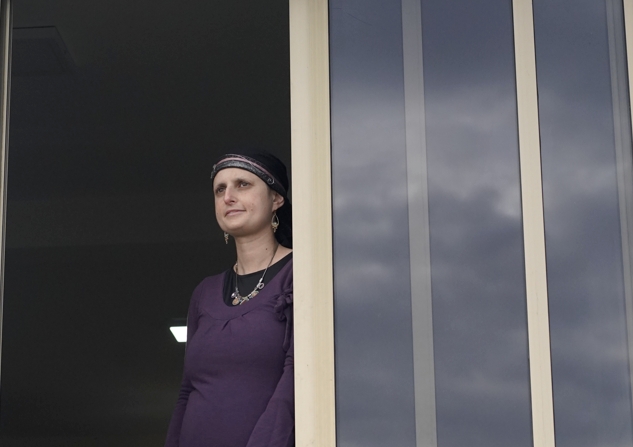 Efrat Libi
Efrat LibiIs this a common phenomenon?
"Yes, it's quite prevalent. In fact, most women dealing with infertility in our group in Samaria already have children. It's not always secondary infertility like in my case. Sometimes, there are those who underwent treatments from their first child, and after succeeding once or twice, they continue the treatments for their next child. We even have women in our group who are undergoing treatments for their fifth child. As part of the film, I also interviewed Dr. Aryeh Berkowitz, a renowned fertility doctor. When I asked him how many children women go through treatments for, he mentioned knowing of treatments for eight and nine children. It's fascinating to see how willing parents are to do everything to have a large family. It's not just about undergoing difficult treatments and complex procedures but also about paying significant financial amounts. The nation funds treatments for up to two children per couple, and from the third child onwards, there's only partial funding."
How did you muster the courage to tackle such a subject and reveal such personal stories?
"Yes, the exposure was stressful and very challenging, but I felt a mission to bring these stories to light and raise awareness. I was clear that if someone were to reveal these things, it should be someone like me, who comes from this sector and has experienced the story firsthand."
Years of Waiting
"I got married at 22," Efrat shares her personal story, "Our eldest son was born soon after the wedding, followed by a daughter. *Baruch Hashem* both arrived easily and naturally. By 24, we had both a son and daughter and felt we were on the right path. But then everything stopped. We wanted to continue growing our family, but it simply didn't happen. Initially, we tried to let time take its course, but after a few years without pregnancy, we started understanding there was likely a problem, and if so, it needed to be addressed. That's how we ended up in a fertility clinic, where we began treatments—initially simple ones and later moved onto IVF. Although doctors didn't diagnose a real reason for the secondary infertility, they recommended treatments, as they too understood that naturally, it wasn't happening. After trying countless alternative methods such as acupuncture, dietary changes, sports, and other parallel ways - we understood treatments were unavoidable."
How did you cope with the new label you received - being challenged by infertility?
"It wasn't easy at all, not just the label but everything we had to go through. We never thought we'd ever be in that place, after all, we have children, and we're supposedly in a different place. Alongside this, there was a strong feeling that Hashem was trying to tell us something, to illustrate that He is the one who manages the world. It's true that sometimes we think we have control over life and that everything is in our hands, but it's not true."
Efrat and her husband experienced a prolonged wait of five and a half years until their third daughter was born via IVF. But they didn't consider stopping there, and soon embarked on another journey—for their fourth child. It is this journey that Efrat describes in the film she chose to produce—‘With Full Hands.’ "I started the film when we were in the midst of treatments, without knowing if or when they would succeed," she clarifies. "It's a documentary. The other two women also bring stories similar to mine, women who already have children and are undergoing treatments to expand their families. Their stories, too, are followed in real-time with us not knowing how they will end, praying for good news by the conclusion of the film."
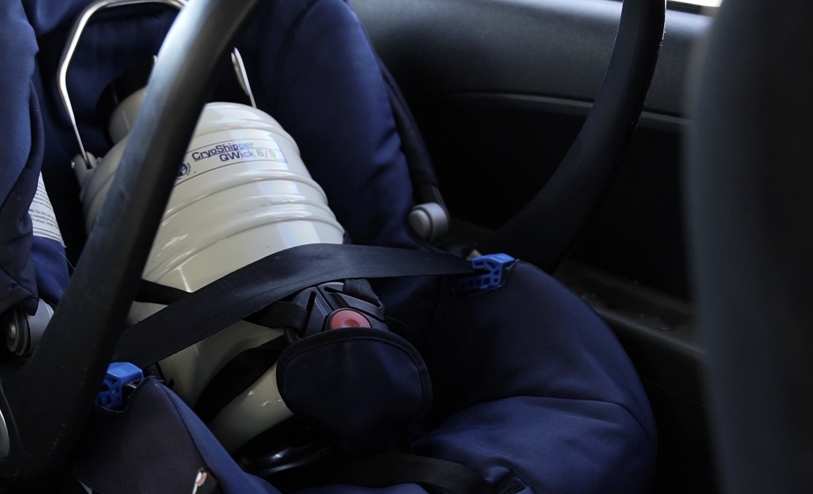 Embryos (Photo: Efrat Libi)
Embryos (Photo: Efrat Libi)What do you think is the most challenging aspect for a woman undergoing treatments?
"I think each woman faces different challenges. There are women who suffer greatly from the physical treatments and injections. Some manage well with the physical pain but find societal reactions harder to bear, while others struggle more with the couple dynamics. You could say every woman experiences a different challenge. In my case, the greatest difficulty was being part of a community where families had high birth rates. Back then, we lived in Har Bracha, a settlement with many large families. Even the rabbi and rebbetzin of the settlement have 13 children. My neighbors and friends were giving birth almost every year, and my heart ached each time anew—why wasn’t it working for me?"
Did people around you understand the hardship?
"Some understood more, and others less. By the way, it was one of the considerations that led me to make the film. It was very important to me that people understand the place we are in, that we wouldn't hear responses like: 'Stop whining, be grateful for what you have.' Because it's not true. We really are grateful, but we also want more. And the reactions like: 'How dare you complain when there are couples with no children at all?' we know too, and regarding that point, it's important for me to convey the message—I'm clear that we can't compare our difficulty to the struggles faced by couples with no children at all. It's not even close. But we are discussing in the film a different difficulty. It exists, and one cannot say that we are complaining for nothing."
Was there a particularly difficult moment during the wait?
"The hardest moments were those of disappointment. There were treatments we were sure would succeed, and eventually, when we understood they led to nothing, we faced very challenging moments. It's very hard to lift yourself up and move on."
The Cost, Sacrifice, and Boundaries
Eliraz Israeli lives just a few houses away from Efrat, but they actually met at a fertility clinic in Bnei Brak. "Eliraz's eldest daughter was born naturally," Efrat narrates, "After that, she went through 13 miscarriages and had two more births. She and her husband, David, really wanted a fourth child, and when it didn't happen naturally, they were told they'd need to undergo IVF, where the best embryos that can survive and develop would be selected. Thus, they too entered the challenge and the difficult wait for the treatments' success."
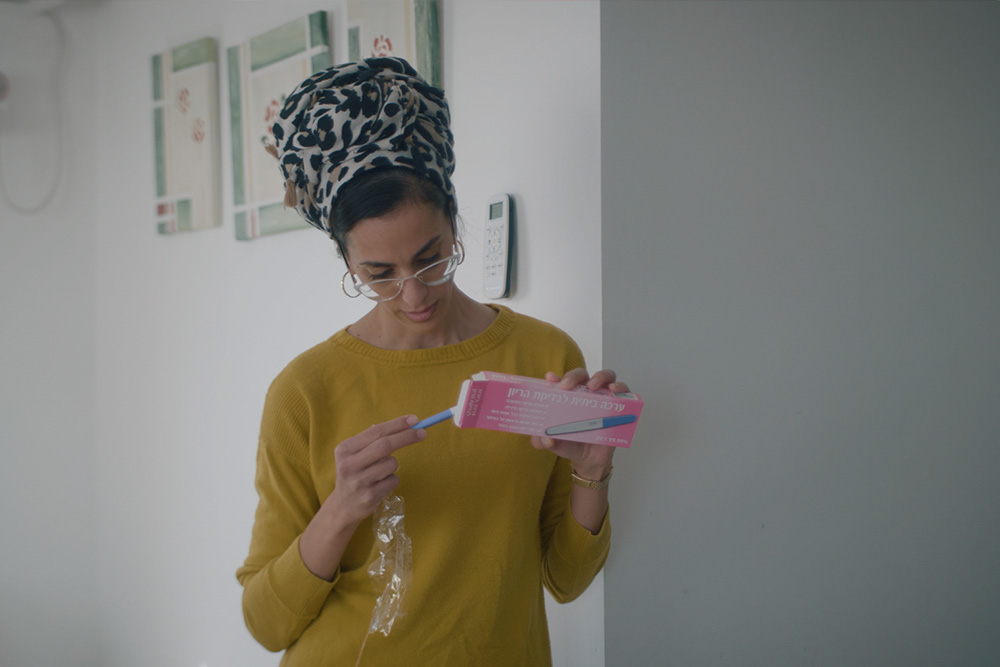 Eliraz Israeli (Photo: Avraham Shapira)
Eliraz Israeli (Photo: Avraham Shapira)Chaya Shmidov also shares her story in Efrat's film. She and her husband, Elchanan, waited seven years until their daughter Tehila was born through fertility treatments. Their second son, Elishama, was born afterward. During Elishama's birth, Chaya experienced a ventricular fibrillation event, and subsequently, doctors advised her not to become pregnant again, as it posed a danger to her life. When Elishama was six, Chaya decided to take the risk and return to treatments.
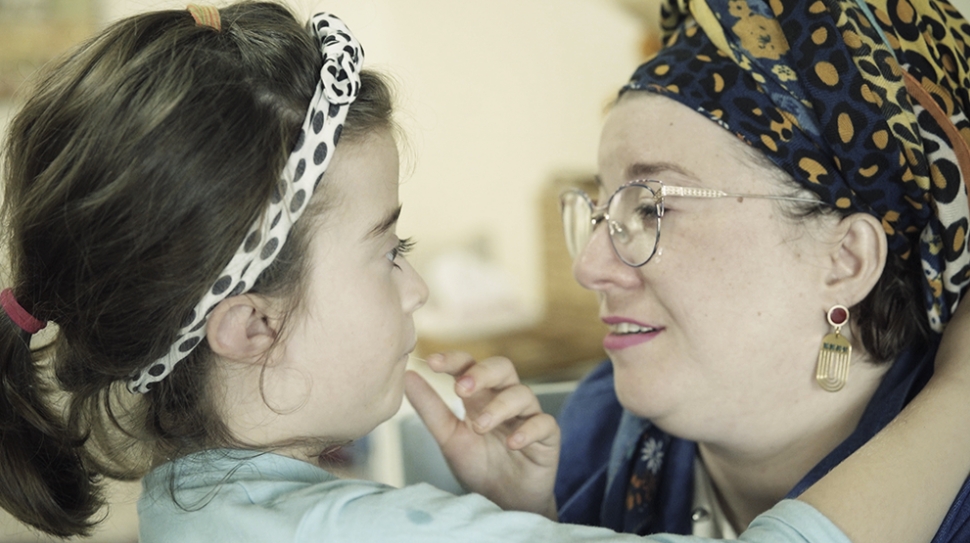 Chaya (Photo: Shira Billig)
Chaya (Photo: Shira Billig)What do you think is the film's peak moment?
"There isn't just one moment. There are many such moments. Personally, I connected most with the moments where Eliraz and Chaya's relatives suddenly understand what they're going through. Like when Chaya's husband tears up as he begins to grasp her struggles, or Eliraz's daughter becomes aware of her mother's pain. When the difficulty is reflected through the eyes of others rather than the film's protagonists, it becomes much more tangible."
Who is your intended audience for the film? Who is the target audience?
"The film was screened at the Haifa International Film Festival and was nominated for the 'Best Documentary Film' award. Additionally, it is shown in various communities and community centers and is intended for every woman, as this is a story that truly every woman can connect to. It raises many feminine issues—treatments, relationships, miscarriages, pregnancy support, and especially—how the home experiences all this and what price we are willing to pay for another child. Beyond that, there's also the faith-based story that accompanies the film throughout. The question of how we handle this confrontation with Hashem, and of course, there is also the social difficulty, as in the religious community with large families, comparison is inevitable. There isn't a day when a woman doesn't feel the gap between her and her friends, her sister-in-law, or her own sister. These are very tangible things."
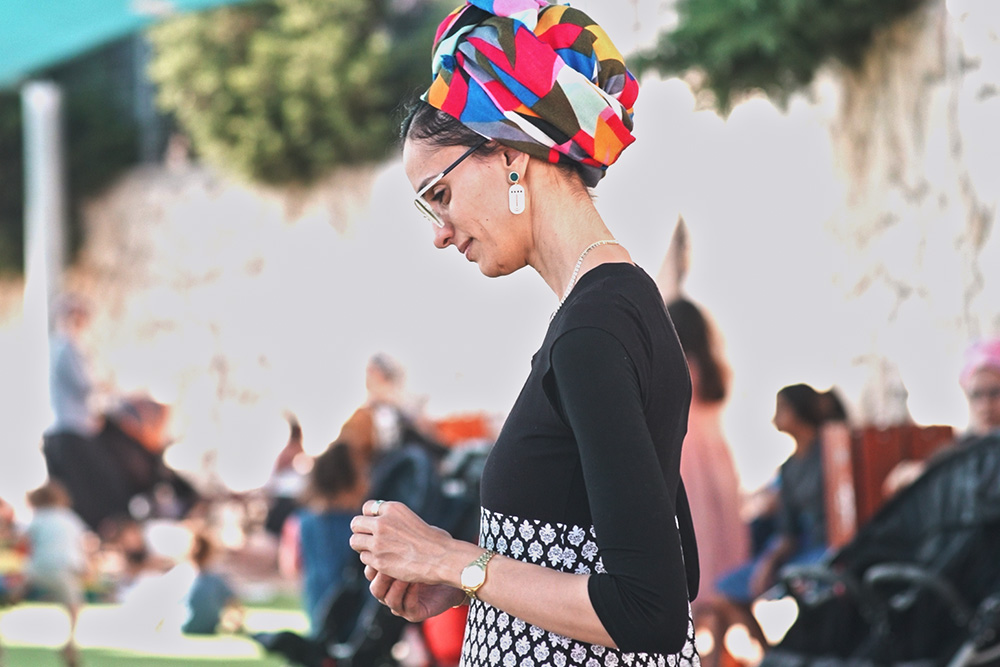 Eliraz Israeli (Photo: Shira Billig)
Eliraz Israeli (Photo: Shira Billig)According to Efrat, the reactions to the film have been incredible. "The film was screened in religious venues and in non-religious places as well, and it was interesting to see how audiences of all backgrounds were moved by it and deeply connected with the characters. At the same time, it also sparked a lot of questions about the price one is willing to pay to expand the family, what one is prepared to endure for the fulfillment of their dreams, and where, in fact, the boundary lies. The truth is, I myself don’t have an answer, because every woman has her own strengths and limits, but many emotions and feelings arise following the viewing. Personally, I was touched when I spoke with one of the individuals who helped us in making the film - a secular Tel Avivian. I asked him after the film, 'And what are you going to work on now?' He replied, 'Work on bringing three more children into the world...' That demonstrated more than anything that the message is being conveyed."

